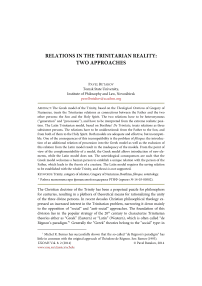Relations in the Trinitarian reality: two approaches
Автор: Butakov Pavel
Журнал: Schole. Философское антиковедение и классическая традиция @classics-nsu-schole
Рубрика: Статьи
Статья в выпуске: 2 т.8, 2014 года.
Бесплатный доступ
The Greek model of the Trinity, based on the Theological Orations of Gregory of Nazianzus, treats the Trinitarian relations as connections between the Father and the two other persons: the Son and the Holy Spirit. The two relations have to be heteronymous (“generation” and “procession”), and have to be interpreted from the extreme realistic position. The Latin Trinitarian model, based on Boethius’ De Trinitate, treats relations as three subsistent persons. The relations have to be unidirectional: from the Father to the Son, and from both of them to the Holy Spirit. Both models are adequate and effective, but incompatible. One of the consequences of this incompatibility is the problem of filioque: the introduction of an additional relation of procession into the Greek model as well as the exclusion of this relation from the Latin model result in the inadequacy of the models. From the point of view of the complementability of a model, the Greek model allows introduction of new ele-ments, while the Latin model does not. The soteriological consequences are such that the Greek model welcomes a human person to establish a unique relation with the person of the Father, which leads to the theosis of a creature. The Latin model requires the saving relation to be established with the whole Trinity, and theosis is not supported.
Trinity, category of relation, gregory of nazianzus, boethius, filioque, soteriology
Короткий адрес: https://sciup.org/147103394
IDR: 147103394
Текст научной статьи Relations in the Trinitarian reality: two approaches
* Работа выполнена при финансовой поддержке РГНФ (проект № 14-03-00502).
The Christian doctrine of the Trinity has been a perpetual puzzle for philosophers for centuries, resulting in a plethora of theoretical means for rationalizing the unity of the three divine persons. In recent decades Christian philosophical theology expressed an increased interest in the Trinitarian problem, narrowing it down mainly to the opposition of “social” and “anti-social” approaches. The foundation of this division lies in the popular strategy of the 20th century to characterize Trinitarian theories either as “Greek” (Eastern) or “Latin” (Western), which is often called “de Régnon’s paradigm.”1 Generally the “Greek” theories belong to the “social” type: in them the Godhead is considered to be a society of divine persons, and the main goal of these theories is to justify the unity of God. This approach supposedly has its roots in Greek patristic theology, and it is dominant in Eastern Christianity. On the other hand, the “Latin” theories start from the unity of the Godhead; therefore they can be characterized as “anti-social,” and the main theoretical problem for them is to justify diversity in this divine unity. This approach is usually associated with the Latin patristics and scholasticism, and it is prominent in the Western Christian tradition.
This division has been fruitful, but it has its limitations, since the criteria of the classification (“to start from diversity” or “to start from unity”) are not precise enough, and it is not always self-evident which group a certain theory should belong to. Another weakness of the debate between the “social” and “anti-social” approaches is that the majority of the suggested theories are not strictly Trinitarian: most of them strive to justify any diversity in unity or the unity of any plurality, but have little interest in the exact number of divine persons; therefore they have a limited application to the Christian doctrine of the Trinity. For a theory to be fully Trinitarian, it has to take into account the consideration that three is not an accidental number for the numerosity of persons. The most natural and traditional way to attach significance to the number of persons is via a category of relation, which plays a crucial role in the dominant Trinitarian theories in the history of Christian church.
In this paper I will analyze two Trinitarian theories which contain the earliest examples of full-fledged “social” and “anti-social” models of the Trinity. The “social” model belongs to Gregory of Nazianzus (329–390), once an archbishop of Constantinople; it is presented in his Theological Orations ( Ors . 27–31) and became paradigmatic for Eastern theology ever since. The author of the “anti-social” model is Boethius (475–525), the first medieval thinker;2 his model is developed in the treatise On the Trinity , and it became the mainstream theoretical approach to theology of the Trinity in the West.3 What is common for both models is that they rely on the Aristotelian category of relation4 to be able to introduce difference in God. Although this category had already been mentioned by earlier theologians to argue that the relative names “Father,” “Son” and “Holy Spirit” do not divide God’s substance, it was Gregory of Nazianzus who made relation an integral part of the Trinitarian theory.5 Both
Gregory and Boethius agree that God is one, and the divine substance is one, yet there are three divine persons named “Father,” “Son,” and “Holy Spirit”; nevertheless, the three names that are predicated to this substance do not disrupt its unity, since relational statements do not say anything about the substance itself. This is perhaps where the similarity between Gregory and Boethius ends, since they vary in their interpretations of what is the exact meaning of the “relation,” and consequently they end up with different and incompatible models of the Trinity. So the primary objective of the present analysis of the two models is to demonstrate the crucial importance of the nuances in understanding of Trinitarian relations, and the drastic consequences of variant interpretations which go much deeper than the “social”– “anti-social” division.
1. Trinitarian model of Gregory of Nazianzus
The main goal of the Trinitarian theory of Gregory of Nazianzus is to support the divinity of the Son and of the Holy Spirit. Gregory’s model is based on the principle of “monarchy” of God the Father, i.e. the person of the Father is considered to be the beginning (ἀρχή) of the Godhead and the source of the divine substance. Since the Son and the Holy Spirit have the Father as their source, they partake of his substance; therefore each of them is the same: God.6
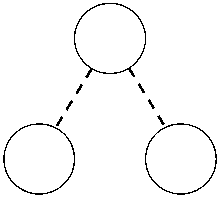
At this stage this model of the Trinity serves two purposes: it explains the consub-stantiality of the three persons and represents the monarchical order of the Godhead: the two evenly converge to the one,7 which distinguishes the Father from the two other persons. But this model is not yet sufficient since it does not provide any means to distinguish between the Son and the Spirit.8 In order to compensate for this deficiency Gregory has to add more elements to his model: the Trinitarian relations. Moreover, it has to be two different relations, otherwise his goal to distinguish between the Son and the Spirit would not be achieved. A third relation is not needed, since it is sufficient to have “relation 1,” “relation 2” and no relation between each pair of the three persons to be able to tell them apart.
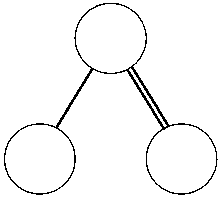
Gregory calls the first relation—between the Father and the Son—“generation,” and the second—between the Father and the Spirit—“procession,”9 which corresponds to the biblical, creedal, and theological terminology and the names of the persons.10 Gregory emphatically forbids to interpret the meaning of the terms “generation” and “procession”11 since it would not only complicate his simple and effective model, but would lead to the danger of erasing the difference between the “relation 1” and “relation 2” for the model to work.12
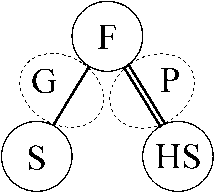
Now the Trinitarian model is exhaustive. It consists of five elements: three con-substantial persons—the Father (F), the Son (S), and the Holy Spirit (HS),—and two heteronymous relations—generation (G) and procession (P). The divine substance is not an element of the model, since it is the substance of the persons. The Father is the source of it, the Son and the Spirit originate from him, receiving his substance and therefore being the same as he is. The Son is connected to the Father by the relation of generation, and the Spirit by procession. The Father is different from the other two because he is the source, while the Son and the Spirit are different from each other on the basis of their different relations with the source.13 And there is no relation between the Son and the Spirit.
It should be noted that in Gregory’s Trinitarian theory the two relations function as crucial elements of the model. They are some reality that is localized between the persons, some kind of a dynamic connection, a link that joins the persons together. “Generation” and “procession” are not localized in the persons, otherwise Gregory would have used the words like “fatherhood” and “sonship,” but rather they are ties that unite the persons into pairs. I am not suggesting that he turns the Trinity into a quintuplet, but his theoretical model is not reducible merely to the three elements. Gregory is able to discuss the two relations separately from the persons and to claim that they differ from each other. He is taking a realistic approach to the understanding of the Trinitarian relations, where generation and procession are descriptions neither of a person, nor of the substance, but of some reality which takes place between the Father and the Son, and between the Father and the Holy Spirit.14
2. Trinitarian model of Boethius
Boethius develops a Trinitarian model which has a primary objective to protect God’s unity and simplicity, yet to find room for the three persons. Following Augustine, Boethius uses the only Aristotelian instrument that allows introducing diversity without a division of the substance: the category of relation. Relative statements about a substance do not say anything about the substance itself. At the same time a relation always points at something else. Since God is called by the relative names “Father,” “Son” and “Holy Spirit,” there must be three relations that point to something else in the one divine substance. Apart from that, Boethius refuses to deduce any extra knowledge from the names, treating them just as the designations of three non-identical relatives that can be located in the simple substance. Thus, in the Boe-thian model the three persons are the three relations, which inhere in the substance without damaging its unity.

Unlike Gregory of Nazianzus, Boethius does not introduce any monarchy into the Trinity, since this would bring an unwanted complexity.15 There is no subordination and no inequity between the persons and their relation is similar to the relation of sameness, i.e. the relation “of the same to that to which it is the same.”16 The tricky part here is that a Trinitarian relation does not refer to itself ( ad se ipsum ), but it does refer to the same ( ad idem ), which means that they are the same substance, but not identical. While Gregory of Nazianzus introduces the category of relation to distinguish between the persons, Boethius uses it to constitute the persons in such a way that there is no other difference between them except for the non-identicalness.

Is there a way to identify each of the persons in this model without adding any extra elements to it? Boethius discovers the solution in the creedal formula: “We shall admit that God the Son proceeded from God the Father, and the Holy Ghost from both.”17 In his Trinitarian model the relations of sameness have to be unidirectional, i.e. not symmetrical. It makes sense, since we can easily say that the Son is the same as the Father, but there is some awkwardness in saying that the Father is the same as the Son. Thus Boethius claims that the relation of sameness in the Trinity is from the Father to the Son and from both of them to the Holy Spirit.18 That means that the Son is the same as the Father, and the Spirit is the same as both of them. Now the persons can be identified, since the Father is the one who the relation is from; the Son is the one who the relation is to and from; the Holy Spirit is the one who the relation is to.
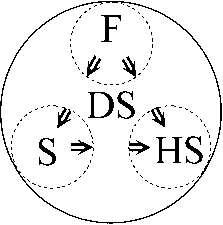
Finally the Trinitarian model of Boethius is functionally complete. It consists of four elements: the divine substance (DS) and three persons—unidirectional rela-tions—the Father (F), the Son (S), and the Holy Spirit (HS). Since the persons are relations, their numerosity does not complicate the divine substance, keeping it one and simple. The relations are like relation of sameness, making the persons equal to each other, and they are directed from the Father to the Son, and from both of them to the Holy Spirit. Unlike in the model of Gregory, there is only one type of relation; therefore there is no need to give this relation any specific name. Nevertheless, for confessional matters this relation can be called “procession” while keeping in mind that in this case “procession” is not different from “generation.”
3. Theological significance of the two Trinitarian models
So we have examined the two Trinitarian theories which were the first in church history to provide exhaustive and functionally complete theoretical models for the “social” and “anti-social” approaches. Their functionality is exhaustive since both are able to support the consubstantiality of the divine persons and their numerosity, and to identify each of the persons. Both models are simple and elegant, and both are Trinitarian, i.e. their structure is tied not to any number of persons but exactly three. In both theories these goals are achieved by an application of the Aristotelian category of relation, although the ways in which the category is applied and the functions of the relations in the models are different.
The two models became two separate paradigms for the later Eastern and Western theological traditions until St. Thomas Aquinas made an attempt to unite both of them into one system in his Summa Theologiae . Aquinas allows for both interpretations of the Trinitarian relations. On the one hand, he speaks of the “relations of origin” in God ( S.T . 1.28.4), which function in the same way as relations in the Gregorian model that bond the persons in pairs. On the other hand, he also uses the Bo-ethian approach to relations and insists that each person is a “subsisting relation” ( S.T . 1.29.4). The combined model is cumbersome and less effective; moreover, it does not work without yet another distinction between opposite and non-opposite relations of origin ( S.T . 1.30.2). It lacks the elegance and simplicity of the paradigmatic models of Gregory and Boethius, and does not allow achieving more than each of them already does. It is beyond the scope of this paper to discuss Aquinas’ theory;
nevertheless, his desire to use both models speaks for their value, and his trouble to combine them reaffirms their incompatibility.
In spite of the fact that both Gregorian and Boethian models describe the same Trinity, use the same terminology and rely on the same Aristotelian category, their structures are fundamentally different. The model of Gregory represents a monarchy where the Father is the source of the divine substance; in the model of Boethius there is no subordination, and all the persons share the divine substance equally. Gregory makes use of the names “Father,” “Son,” and “Spirit” to deduce the relations from their meaning; Boethius uses the names as mere designations of the three subsisting relations. There are two different real relations in the model of Gregory—generation and procession; there is only one type of relation in the model of Boethius, which may be called “procession” in the religious context. The two relations of the Gregorian model are indispensable individual elements of it; the relations in the Boethian model are not different from the persons and therefore are not additional elements. Gregorian relations are localized between the persons and characterize the reality that ties the persons together; Boethian relations are localized in the persons or, more precisely, they are the persons.
I suppose that the problem of the reality of Trinitarian relations reveals a theological weakness of Gregory’s theory in comparison with the theory of Boethius. The structure of the Gregorian model depends upon the existence of two different relations in the Trinity: generation and procession. It requires a position of extreme realism concerning the status of the relations; otherwise they could not function as individual elements of the model, and the objective difference between the two relations would not be justified. In other words, Gregory treats generation and procession as subsisting realities that are different from the persons. That means that God is one substance, three persons and two relations, which, I guess, is theologically problematic. In the Boethian model subsisting relations coincide with the persons, and it does not lead to the multiplication of entities.
There are other theological consequences of the differences between the models of Gregory and Boethius. They include the problem of filioque , the question of completeness of the Godhead, and soteriological consequences.
-
(i) The filioque problem
The problem of filioque has been a stumbling block between the Christian East and West for over a millennium. The difference appears in the formulation of the Nicene Creed, which in the East is confessed in the original 381 A.D. form, where the Holy Spirit is said to proceed from the Father, while in the West the Creed includes a later addition of one Latin word “ filioque ” (“and son”), resulting in the Spirit’s procession from the Father and the Son. Generally Eastern theologians claim that the addition of the filioque distorts Trinitarian theology and insist on its removal from the Creed. At the same time the West maintains that the filioque expresses a valuable truth about the Trinity and should not be discarded. Keeping in mind that the Eastern theological approach is in accordance with the Trinitarian model of Gregory of Nazianzus, and the
Western with the model of Boethius, it should be worthwhile to examine how the two models will be affected by the insertion or removal of the filioque .
In the model of Gregory the relation of procession is the unique bond that ties the Father with the Holy Spirit. An insertion of the filioque will result in that the same relation of procession appears between the Son and the Spirit, since the filioque requires that the Spirit proceeds from the Father and the Son .
/ — add flioque ^
It is clear that the additional relation of procession leads to the confusion of the persons of the Father and of the Son, since both are now connected to the Spirit with the same relation. Therefore, the insertion of the filioque ruins the model of Gregory because it can no longer provide a distinction between the persons.
In the model of Boethius the relation of procession is directed from the Father to the Son, and from both of them to the Holy Spirit. If the 381 A.D. Creed is to be interpreted in such a way that the Spirit proceeds only from the Father, then procession from the Son to the Spirit has to be removed from the model.
zTTTx z7^V\
/ v^ji/; \ / v^_.^-/; \
^. ^ . — remove filioque ^ ^. ^ .
Vs^ ^hs/ V ) ( V
The removal of the relation between the Son and the Holy Spirit from the Boethi-an model results in the inability to tell the difference between the Son and the Spirit. Thus, the filioque is a crucial part of the model, and its loss will lead to the confusion of the divine persons.19
So, the question whether the filioque should or should not be in the Creed depends on the choice of the Trinitarian model, and the decision to change the Creed requires a change of the whole theological paradigm.
-
(ii) The completeness of the Godhead and soteriology
Another way to compare and evaluate the Trinitarian models of Gregory and Boethius is from the point of view of their complementability, i.e. “openness” or
The structure of the Trinitarian model of Gregory of Nazianzus is such that each of the persons except for the Father is connected to the Father with a unique relation. There is a theoretical possibility of adding another person to the model in such a way that it would be attached to the Father with its own unique relation.

This additional person “Z” and its “relation 3” with the Father do not have any effect on the Son and the Spirit and their relations with the Father. Therefore, the Gregorian model is complementable. It is open for another member of the divine society: the Father hypothetically can be a source of another consubstantial person and have a special relation with it, thus turning the Godhead into a quaternity. In spite of its original Trinitarian structure, the Gregorian model has no internal means to remain strictly Trinitarian or to justify the threeness of persons.20
In the model of Boethius each person of the Trinity is constituted by unidirectional relations in such a way that the number of possible options is exhausted by three: the Father is the one who the relation is from; the Son is the one who the relation is to and from; the Holy Spirit is the one who the relation is to. A person with no relation can not be a fourth option, since for Boethius a divine person is a subsisting relation to other divine persons. An attempt to introduce a fourth relational person to the Boethian model will have severe consequences for the members of the Trinity.
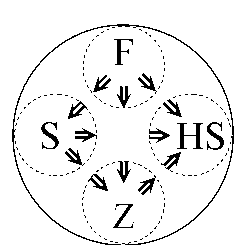
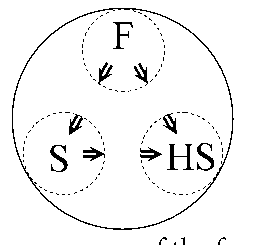
— add person “Z” ^
Such an addition of the fourth person “Z” results in that each person of the Trinity now has to be a relation to the three, not to the two other persons. Moreover, even if the Father and the Spirit remain to be distinguished as, loosely speaking, the ultimate “beginning” and the “end” of relations, both the Son and the new person “Z” are those who the relation is “through.” The only way to tell the difference between the Son and “Z” is to introduce a new parameter: a quantity of relation, so that one will have “1 in, 2 out” and another “2 in, 1 out” which will result in a significantly different model. Thus, the model of Boethius does not allow adding more elements to it; it is non-complementable and strictly Trinitarian.
Theological consequences of complementability of the models are such that the model of Gregory welcomes new elements while the model of Boethius rejects them. The God of Gregory can hypothetically have many more persons and internal relations, and our knowledge of the number of divine persons is framed only by the limits of revelation. For Gregory himself the Trinitarian structure of his model is based on the orthodox interpretation of the Scripture, but not on his theological approach. His model provides an opportunity for an unorthodox adherent of the model to introduce a new divine person.21 As for the model of Boethius, it is strictly Trinitarian in itself, i.e. it has internal means to safeguard itself from any additions; therefore any attempt to introduce a new divine person would require not only an alternative understanding of Scripture, but also a choice of another model of the divine relations. So, from the point of view of relational (personal) completeness of the Godhead, the model of Boethius provides a better approach to the Trinity. In the model of Gregory the number of persons is never complete since it always allows adding more, while the Boethian model restricts this number to three.
On the other hand, there is a weakness in the model of Boethius, which the model of Gregory does not have, and it has to do with the problem of the impersonal substance. For Gregory the divine substance is the substance of the Father, and all other persons receive the substance from him. There is no substance apart from the persons, which is not so apparent in Boethian model. Boethius approaches the Trinity starting from the unity of substance; after that he locates three relations is this substance that are identified as persons. Now the question is whether the substance is exhausted by the three persons, i.e. is there any impersonal substance left in God?
The answer is no, but the model itself does not provide an obvious support for this negative answer. Of course, the persons are not parts of God, so a simple equation such as %+%+%=1 is not applicable here. Moreover, according to Boethius, nothing but relation can be predicated to the substance to introduce distinction without the loss of unity; therefore there can be nothing in the substance but relations, i.e. the persons. Nevertheless, in the model of Boethius the divine substance is primary to the relations, and it can be discussed without even mentioning the persons, as if there is an impersonal god that is not necessarily Father, Son and Holy Spirit. Thus, from the point of view of the substantial completeness of the Godhead, in the model of Gregory the complete substance of God is enclosed in the persons, while the model of Boethius allows for a divinity that is not necessarily or completely personal.
Finally a few words have to be said about soteriological consequences of the two models. In order to do that I will again exploit the notion of complementability of models, and will discuss soteriology in the context of establishing a relation with God. As it was said earlier, the Trinitarian model of Gregory of Nazianzus is complementable, i.e. open for new elements—new persons and new relations. Each person is connected to the Father by a unique relation, and the whole model hinges on the Father. Such a structure suggests the same pattern for a relationship between God and a human person, since, according to the complementability of the Gregorian model, it is proper for God to welcome new persons into relation with the Father. Having established a unique relation with the Father,22 a human person in some sense becomes a full member of the divine society equal to the Son and the Spirit, thereby acquiring a divine status. The theological idea of salvation as deification ( theosis ) is fully supported by the model of Gregory, and that is probably one of the reasons why is it so pervasive in the Eastern theology.
But if deifying salvation is accomplished in a relation with the Father, what is the role of the Son and the Holy Spirit in it? If membership in a family is defined by a relation with the head of the family, the relations with other members are not significant to it. Nevertheless, other members can provide considerable help in acquiring and in sustaining this relation with the head. So the Son and the Holy Spirit, being benevolent members of the most excellent family, do their best to welcome and to support a new member, but, frankly, they do not participate in the saving relationship, since the relations in the divine family can only be with the Father. As far as I see it, a major disadvantage of the model of Gregory is that it excludes the Son and the Holy Spirit from the saving relation with a human person, leaving for them a role of external support. At the same time, a major advantage of this model is that it stresses the personal character of the relation between the Father and a human being, which is not so for the model of Boethius.
As it was shown earlier, the Trinitarian model of Boethius is non-complemen-table, i.e. closed for any new relations. No new person can establish a relation with any person of the Trinity, since all the three divine relations form an internal closed circuit. In turn, no single person of the Trinity can enter any external relation or start an individual external activity without a rupture of internal Trinitarian relations. Whatever God does outside of himself (so-called “ opera ad extra ”), he does by all three persons together. There is no way for a human person to have a relationship either with the Son, or with the Holy Spirit, or even with the Father himself, but only with the triune God. There is a radical difference between an external relationship of the triune God with a human person and internal Trinitarian relations; therefore a human person never becomes a member of the “inner circle” of the Trinity and never acquires a divine status. The model of Boethius has no means to support the idea of deification ( theosis ), thus a creature continues to be a creature even having established the saving relationship with God. On the other hand, one of the major advantages of Boethian model is that the Son and the Holy Spirit are not excluded from salvation. To have a relationship with God means to have a relationship with the whole Trinity, to become a partaker of the fullness of the Trinitarian life, and not just of the life of one divine person. At the same time this inability for a human to have a relation with a divine person is also a major disadvantage of this model. As I see it, a relationship requires persons on both ends, while according to the model of Boethius a human person can only have a relationship with God, i.e. with the divine substance. Even if we relate to God as a Trinity of persons, this Boethian Trinity is a closed and non-complementable community. For Boethius the Trinitarian persons are defined only by their mutual relations, so it is not clear how they can participate in any other relationship but with themselves. As a believer seeking personal relationship with God, I have a hard time understanding a relationship either with a substance or with a closed community of persons that do not relate to me.
To summarize the soteriological differences between the two models it can be said that neither of them is definitely better then the other. Each model has its benefits and weaknesses. In the complementable model of Gregory a human person is welcome to establish a relationship with the person of the Father; in the non-complementable model of Boethius the relationship is established with the triune God. The Gregorian model supports the idea of theosis; therefore salvation is understood as rising above the creaturely status and becoming divine, while the Boethian model does not provide any means for human deification. According to the model of Gregory, the Son and the Holy Spirit do not directly participate in the relationship with the human person, while the model of Boethius necessitates the participation of the whole Trinity in this relationship. Finally, the model of Gregory emphasizes a personal character of the salutary relationship with God, which is not so for the model of Boethius.
4. Conclusion
I hope that the present analysis of the Trinitarian models of Gregory of Nazianzus and Boethius is sufficient to demonstrate the vital importance of an application of the category of relation to Trinitarian theories. Moreover, the nuances of this application have much deeper theoretical and theological consequences than “social”– “anti-social” requirements of “starting from diversity” or “from unity.” The actual dividing line between Eastern and Western Trinitarian traditions seems to be rooted in their understandings of the Trinitarian relations, whether these are a reality that connects the divine persons, or they are the persons themselves. Of course, the theories of Gregory and Boethius lack the philosophical depth and subtlety of modern Trinitarian projects; on the other hand, they provide full-fledged and adequate models of the Trinity, while modern philosophical theology is mostly concerned only with the unity vs. diversity problem. I hope that this paper will motivate contemporary philosophers and theologians to reconsider their approaches to the Trinity in the light of the Trinitarian relations.
Список литературы Relations in the Trinitarian reality: two approaches
- Ayres, L. (2006) Nicaea and its Legacy. An Approach to Fourth-Century Trinitarian Theology. Oxford University Press.
- Barnes, M. R. (1995) “De Régnon Reconsidered,” Augustinian Studies 26.2, 51-79.
- Beeley, C. A. (2008) Gregory of Nazianzus on the Trinity and the Knowledge of God: In Your Light We Shall See Light. Oxford University Press.
- Bradshaw, D. (2009) “The ‘Opuscula Sacra’: Boethius and Theology,” in: J. Marenbon, ed. The Cambridge Companion to Boethius. Cambridge University Press: 105-128.
- Butakov, P. (2012) “The Category of Relation in Early Christian Trinitarian Theories” [in Russian], Novosibirsk State University Bulletin. Philosophy 10-4, 134-141.
- Dulles, A. (1995) “The Filioque: What Is at Stake?” Concordia Theological Quarterly 59, 31-48.
- Marenbon, J. (2003) Boethius. Oxford University Press.
- Sergeev, M. (2006) Sophiology in Russian Orthodoxy: Solov'ev, Bulgakov, Losskii, and Berdiaev. Lewiston, NY: Edwin Mellen Press.
- Siecienski, A. E. (2010) The Filioque: History of a Doctrinal Controversy. Oxford University Press.

